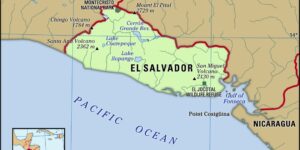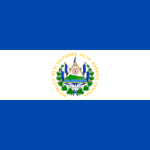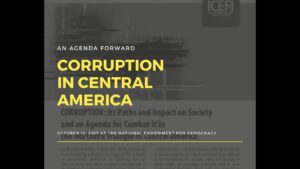El Salvador is embarking on the same path as Venezuela, and President Nayib Bukele is using democracy “to dismantle it,” a Washington forum heard yesterday.
“El Salvador is closely connected with the global trend of democratic decline”, said Miriam Kornblith, Senior Director for Latin America and the Caribbean at the National Endowment for Democracy. “Countries like Venezuela, Ecuador, Bolivia and Nicaragua were part of of the model of socialism of the XXI century, which ended in a very regrettable way in Venezuela and Nicaragua, with dictatorships,” she told a Wilson Center webinar (above).
“From the ideological point of view, these are experiences of a different nature, but from the point of view of the appreciation of democratic institutions and the defense of the values of human dignity they are at a very worrying point,” said Kornblith, citing “abuse of the media,” a fact that the international community should not let pass. “In the Venezuelan case, many years passed before civil society and the international community reacted and when the seriousness of the tragedy reacted it had reached a terrible point,” she added.
 What is happening in El Salvador is profoundly relevant to understanding ways in which the attacks on our global information systems contribute to the erosion of democracy around the world, Joel Simon, executive director of the Committee to Protect Journalists, writes for the Columbia Journalism Review:
What is happening in El Salvador is profoundly relevant to understanding ways in which the attacks on our global information systems contribute to the erosion of democracy around the world, Joel Simon, executive director of the Committee to Protect Journalists, writes for the Columbia Journalism Review:
El Salvador, a tiny sliver of a country with a history of violence, is also home to one of the world’s leading digital news organizations. It’s called El Faro, or The Lighthouse, and for more than 20 years it has provided not only day-to-day coverage of events in Central America, but also deep investigations into corruption, human-rights abuses, and gang violence. .. El Faro has an innovative financing model that has allowed it to survive and thrive, with a current staff of 35. It receives revenue from ads, reader donations, events, and grants from international foundations.
 El Faro has chipped away at Bukele’s carefully crafted image, reporting his alleged corruption, his mishandling of the Covid-19 pandemic, his growing authoritarianism, and a secret truce with the leaders of the MS-13 gang in which the president promised more lenient prison conditions if the gangs would temper their violence and support for his political project. Critics called it a deal with the devil, Simon adds.
El Faro has chipped away at Bukele’s carefully crafted image, reporting his alleged corruption, his mishandling of the Covid-19 pandemic, his growing authoritarianism, and a secret truce with the leaders of the MS-13 gang in which the president promised more lenient prison conditions if the gangs would temper their violence and support for his political project. Critics called it a deal with the devil, Simon adds.
Bukele’s government has now launched an audit of El Faro, that has reported on corruption in government contracts and suggested Bukele may have cut a secret deal with powerful street gangs to cut the murder rate, Bloomberg reports. The president denies the reports and last month accused the newspaper of laundering money. El Faro director Jose Luis Sanz dismisses the accusation and audit as an attempt to silence the free press.
“Nayib Bukele wants to consolidate a political project and leave no space for pluralism, much less free speech and public questioning from independent newspapers,” Sanz said in an interview. “Freedom of expression in El Salvador is in critical condition.”
 The El Faro story came just months after a July report by the International Crisis Group (ICG), which said a substantial drop in homicides in El Salvador could be due to what it called a “fragile informal understanding,” which could include a “non-aggression deal” between parts of the government and the gangs, adds Steven Dudley, InSight Crime’s head of research for Mexico, Central America and the Caribbean and a senior fellow at American University’s Center for Latin American and Latino Studies. Since Bukele became president in June 2019, the ICG noted in a deep analysis of the homicide rates, murder in El Salvador had dropped by as much as 60 percent, he writes for Open Democracy.
The El Faro story came just months after a July report by the International Crisis Group (ICG), which said a substantial drop in homicides in El Salvador could be due to what it called a “fragile informal understanding,” which could include a “non-aggression deal” between parts of the government and the gangs, adds Steven Dudley, InSight Crime’s head of research for Mexico, Central America and the Caribbean and a senior fellow at American University’s Center for Latin American and Latino Studies. Since Bukele became president in June 2019, the ICG noted in a deep analysis of the homicide rates, murder in El Salvador had dropped by as much as 60 percent, he writes for Open Democracy.
“We condemn President Bukele’s recent actions, which violate fundamental human rights and undermine democratic values in El Salvador,” said Deborah Ullmer, director of Freedom House’s Latin America and Caribbean programs. “He has defied Supreme Court orders to respect basic rights while enforcing quarantine regulations, imposed inhumane conditions on jailed people, and authorized the use of lethal force against gangs. We call on the president to reverse course, protect fundamental rights, and respect the rule of law and due process.”
In El Salvador, a beacon of truth under threat https://t.co/6aWJS7R1ST via @cjr
— Democracy Digest (@demdigest) October 8, 2020
On February 9, just weeks before the coronavirus hit El Salvador, Bukele forced his way into the Legislative Assembly surrounded by armed soldiers, notes analyst Carlos Dada. He had spent the previous days warning lawmakers that he had constitutional grounds to dissolve the legislative body if it didn’t approve a security loan he was asking for, paving the way for an attempted coup, he writes for Dissent:
He believed his approval rating (at that point over 90 percent) gave him enough leverage to get away with it. Bukele sat in the seat reserved for the chairperson of the assembly, hit a gong to open the almost empty legislative session he had summoned, and prayed. Then he suddenly left the hall and told hundreds of followers waiting outside that God had asked him to be patient. He gave lawmakers one more week to approve the loan (as of this writing, they have yet to vote on the proposal). The coup was averted.
The scene seemed preposterously outdated. But it was a sign of the times. In El Salvador, as in most of Central America, democracy is being dismantled. And very few people outside the region are watching, Dada warns.
 In a meeting with Amnesty International in June 2019, Bukele committed to implementing a comprehensive public security strategy that would, in theory, prioritize a prevention and rehabilitation approach. He further acknowledged the important work of Salvadoran civil society organizations and the role that human rights defenders play in the country, Amnesty reports.
In a meeting with Amnesty International in June 2019, Bukele committed to implementing a comprehensive public security strategy that would, in theory, prioritize a prevention and rehabilitation approach. He further acknowledged the important work of Salvadoran civil society organizations and the role that human rights defenders play in the country, Amnesty reports.
In its preliminary observations, the Inter-American Commission on Human Rights (IACHR), echoed the concerns of civil society organizations, such as the armed forces’ involvement in public security tasks and a lack of information, transparency, and participation on the part of organizations in the design of the Territorial Control Plan.
Over time, we have begun to see how the president’s promises have been broken one by one and how the government’s actions have actually moved in the opposite direction. While the government’s agreement to the IACHR’s visit was an important step, it was not necessarily accompanied by a firm commitment that would go beyond the visit and result in a visible improvement in the lives of the Salvadoran people.







